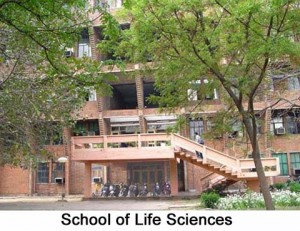
Image of School of Life Sciences (JNU)
The School of Life Sciences (SLS) was established on the basis of a report prepared by a working group headed by Prof. M.S. Swaminathan in the year 1970. The School stands today as a unique institution in the country where multidisciplinary and interdisciplinary teaching and research in life sciences have established permanent roots. The uniqueness of the School essentially lies in the fact that within the School’s faculty there are experts and active researchers representing almost all areas of modern biology. Life sciences in its entirety constitute wide range of our research programmes.
The School believe that postgraduate teaching, in order to be effective, must be done by teachers who are also actively involved in research in their respective areas of specialization. The School have developed a teaching programme which stresses on the uniformity principals of molecular and cellular mechanisms in all living systems. The School have also made pioneering efforts in integrating physical sciences with biological sciences.
In SLS, students from physical sciences are also inducted to study life sciences. Remedial courses in biology are offered to students from physical sciences stream, and students from biological stream are given courses in physical sciences and mathematics. For a total of approximately 50 seats School offer each year in M.Sc. and M.Phil/Ph.D. programmes. Selections are done through an all India written test and interviews. The School has been recognized as Center of Excellence under UGC-COSIST and DSA Special Assistance Programmes. In addition, UGC also provides JRF/SRF Fellowships to M.Phil/Ph.D. students of science streams who qualify the national entrance test of JNU.
Research and Activities
Quality teaching requires ongoing research activities which needs a good deal of financial support. While it is our national mandate to provide training of the highest quality of life sciences, university system due to its own constraints, provides little intramural support for the research programmes. SLS is fortunate to bring in research funds through national and international agencies in the form of research projects.
National funding agencies like Department of Bio-Technology, Council of Scientific & Industrial Research, Indian Council for Agricultural Research, Indian Council for Medical Research, Department of Science & Technology, Defence & Ordinance Department, Department of Atomic Energy also DAAD etc. and even international agencies like WHO, USDA, European Commission, German Indo-French, Indo-US and host of others have generously supported the ongoing research of the School.
The School has through various research grants, obtained a cumulative sum of about Rs. 17 crores, for its ongoing research activities. But for the research project funding obtained by the SLS faculty, it would have been impossible to run our research training programmes.
Research projects thus not only enable the faculty members in running their research programmes, but also enable the students to take challenging and modern research topics for their M.Phil. and Ph.D. thesis.
Students trained at SLS are in demand. Almost all the students completing Ph.D. degrees from SLS(285 till date), get opportunities for post-doctoral work abroad, and a great many return to serve the country . School’s faculty and students publish extensively in reputed national and international journals. To date, SLS has to its credit, over 2000 research publications.
These research efforts have resulted in numerous awards, honours and recognitions to the students and the faculty of SLS. There are three Bhatnagar Awardees, four fellows of the Indian National Science Academy, four fellows of the Indian Academy of Sciences and six fellows of the National Academy of Sciences within the SLS faculty. First international patent from India (AmA I) was obtained from SLS. Several other patents are in the pipeline including one for a very sensitive immunodiagnostic method for detecting tuberculosis antigens.
Collaborations
Since SLS has faculty with expertise in all major areas of Modern Biology, School’s faculty is very often called upon to teach in other Universities. The School has also extended support and help in developing teaching programmes and organizing refresher courses in other Universities.
The faculty of the School plays important roles in University Grants Commission/Council of Scientific & Industrial Research (CSIR), National testing for NET examinations/research fellowships for RAs, JRFs and pool officers. Our faculty members also serve on a vast array of national committees and task forces. Two SLS faculty members (Prof. P.N. Srivastava and Prof. Asis Datta) have occupied the University VC’s position and one (Prof. P.N. Srivastava) served as President, Indian National Science Congress. The School provides a pool of experts for governmental agencies like University Grants Commission, Department of Bio-Technology, Department of Science & Technology, Indian Council for Agricultural Research, Indian Council for Medical Research, CSIR, Union Public Service Commission (UPSC), National Council for Educational Research & Training (NCERT) and others.
Several faculty members have worked for the working groups of the Planning Commission, on health, education and biotechnology and members on state councils. The School also provides research supports to the students, teachers and researchers from other state university by allowing them to use its CIF facility. The School therefore, serves as a catalyst in the vital scientific and educational activities of India and has commitment to continue its service for the nation.
The School has link-research activities with other institutes in the country, like Nuclear Science Centre (NSC), National Institute of Immunology (NII), All India Institute of Medical Sciences (AIIMS), Centre for Cellular and Molecular Biology (CCMB), Tata Institute for Fundamental Research (TIFR), Institute for Nuclear Medicine and Applied Sciences (INMAS), Bhabha Atomic Research Centre (BARC), International Centre for Genetic Engineering & Biotechnology (ICGEB) etc. and several other universities. The School is also the nodal affiliating body for CCMB, Hyderabad and NII, New Delhi. Most faculty members have collaborative research programmes with institutions in Germany, France, Russia, Poland, USA, Israel and several other national and international institutions.